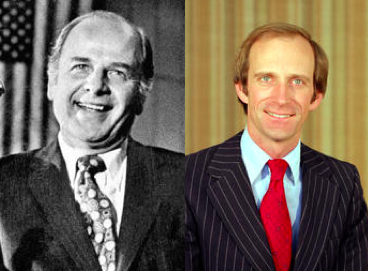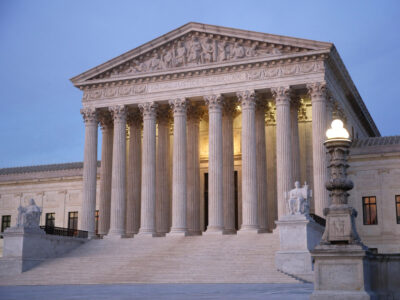Earth Day’s 50th Anniversary: A Reflection
Why Celebrating Environmental Values & Goals Is Now More Important Than Ever

Today marks the 50th anniversary of America’s first Earth Day. Beginning on April 22, 1970, the United States and global community have rallied each year to celebrate environmental values and goals. It seems especially important to commemorate and continue that tradition in the midst of the current coronavirus pandemic.
The first Earth Day was a societal reaction to a number of key, alarming environmental events: in 1962 Dr. Rachel Carson published her transformative book, Silent Spring, which alerted readers in the U.S. and worldwide to the environmental perils associated with uncontrolled use of pesticides. And in 1969, two infamous American environmental disasters drew broad media coverage and underscored the hazards of unbridled industrial development: first, the Cuyahoga River in downtown Cleveland was so heavily polluted by nearby factory discharges that the river actually caught on fire; and second, an offshore oil platform in California’s Santa Barbara Channel blew out, causing what at the time was the largest oil spill in American history. (The story goes that a then-obscure U.S. Senator from Wisconsin, Gaylord Nelson, actually came up with the idea of organizing Earth Day when he inspected the Santa Barbara oil spill–which spewed over 3 million gallons of crude oil into nearshore waters–from an airplane.)
It’s often said that success has many parents, but that failure is an orphan. With that adage in mind, it’s unsurprising that many people and organizations take credit for devising and organizing the first Earth Day a half-century ago. But as someone who was actually around and participated in that inaugural event (as an undergraduate student at U.C. Santa Barbara), I believe the largest measure of credit properly goes to Senator Nelson, along with Senator Edmund Muskie from Maine, California Republican Congressman Pete McCloskey and environmental activist Denis Hayes.
In contrast to the tumultuous and sometimes violent demonstrations of the 1960’s, the first Earth Day turned out to be a quite different kind of political event. Reportedly, some 20 million Americans participated in peaceful demonstrations across the nation on April 22, 1970, advocating for environmental values and reform.
The most important long-term consequence of the first Earth Day was the environmental law and policy changes it generated. The same Congressional leaders who’d organized that event went back to Washington and promptly launched the most prodigious outpouring of environmental legislation in American history–enacting the Clean Air Act, Clean Water Act, CERCLA and the Endangered Species Act, to name but a few. And that first Earth Day is also credited with prompting the creation of environmental studies programs in colleges and universities throughout the U.S., and making environmental law a major component of American law school curriculums.

Since 1970, Earth Day has grown to become a truly global phenomenon, largely due to the continued energy, vision and organizational talents of activist Denis Hayes. Following the success of the first Earth Day, Hayes founded the Earth Day Network, which eventually transformed Earth Day into an annual event celebrated in over 180 nations.
In recent years, Earth Day celebrations have increasingly focused on the global threat posed by climate change. Earth Day 1990 is widely credited with paving the way for the United Nation’s 1992 Earth Summit in Rio de Janeiro that launched global climate change diplomacy. And Earth Day 2016 was highlighted by 174 nations formally signing, at U.N. headquarters in New York City, the landmark Paris Agreement that the international community had successfully negotiated four months earlier.
Fast forward to Earth Day 2020, which promises to be a global environmental celebration quite different from its predecessors. That’s because the COVID-19 pandemic will preclude the traditional mass gatherings of people in major cities around the globe. Instead, organizers of this year’s Earth Day are focusing on digital mobilization efforts, and hope to engage over one billion people online.
in some ways, Earth Day 2020 may be the most consequential in decades. Recent commentary and studies have documented the nexus between the COVID-19 pandemic and global environmental degradation–particularly on the climate change front. Today’s Earth Day festivities promise to refocus the world community–at least for a day–on the long-term perils that climate change and related environmental crises pose for our planet.
Here in the United States, Earth Day 2020 can also shine a welcome spotlight on the environmental issues that will hopefully play a central role in this year’s presidential election campaign. Never in the past half century have the major presidential candidates offered such a starkly divergent vision of America’s environmental future. Let’s hope that today’s Earth Day energizes a thoughtful, lively political debate over the next six months on what that future should look like.
Reader Comments
3 Replies to “Earth Day’s 50th Anniversary: A Reflection”
Comments are closed.






The worst case scenario environmental fact of life today on Earth Day 50 is:
“2020 on track to be Earth’s warmest year on record, NOAA says”
https://thehill.com/policy/energy-environment/493999-2020-on-track-to-be-earths-warmest-year-on-record-noaa-says
Tragically, the Pogo poster on Earth Day 1970 is still correct:
“We have met the enemy and he is us.”
We are still our own worst enemy, especially since we were warned by the 2006 CALIFORNIA Magazine “Global Warning” special issue, including:
“Can We Adapt in Time?”
https://alumni.berkeley.edu/california-magazine/september-october-2006-global-warning/can-we-adapt-time
Can Legal Planet do anything about this before time runs out!
Great article Rick! Hard to believe it’s been 50 years. I was a junior in high school organizing everyone to bike to school. Bob was probably working at USFS Experiment Station in Berkeley. Hope you and family are staying safe.
Another Earth Day anniversary has come and gone while our politicians and intellectuals continue to fail to adapt in time, with nothing but denials while failing to meet the challenges of change as NOAA warns us that 2020 is on track to be earth’s warmest year on record even though we were warned by our own 2006 CALIFORNIA Magazine “Global Warning” issue. Indeed, We have met the enemy and he is still us.